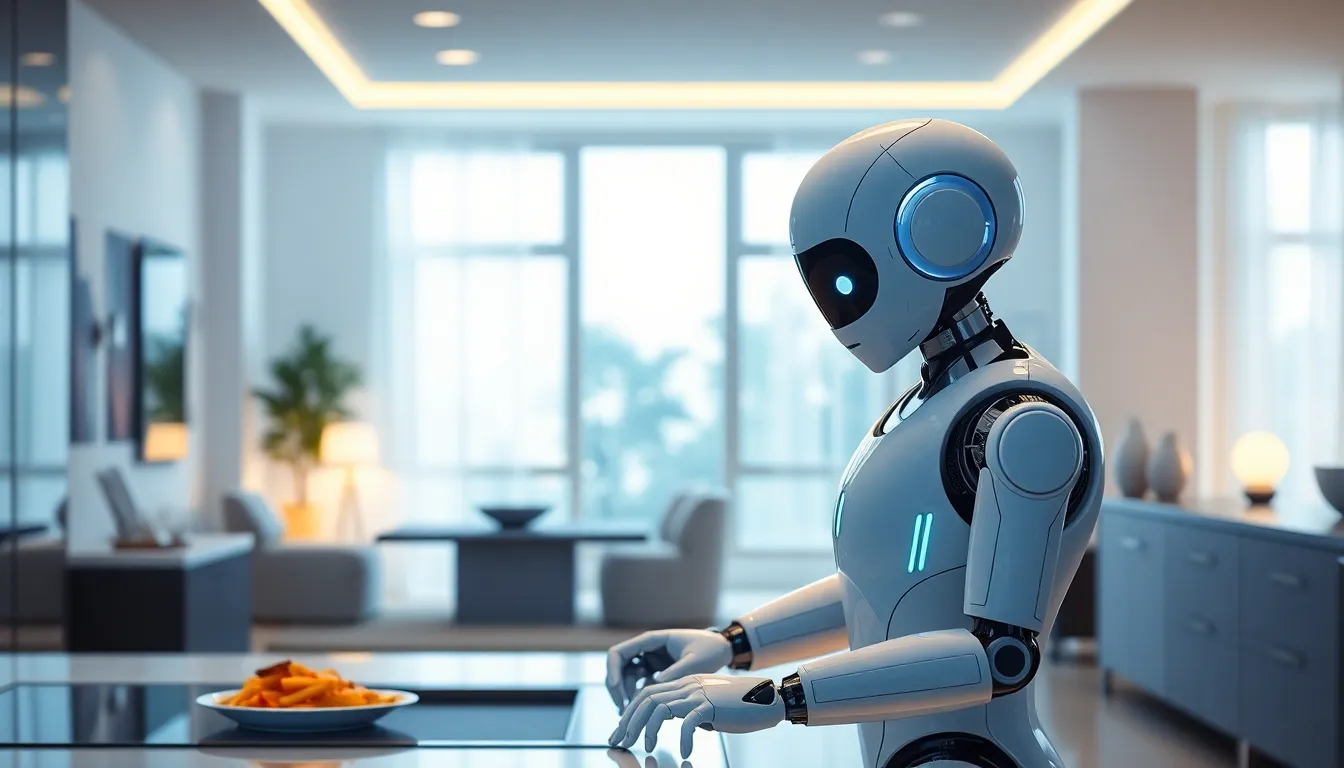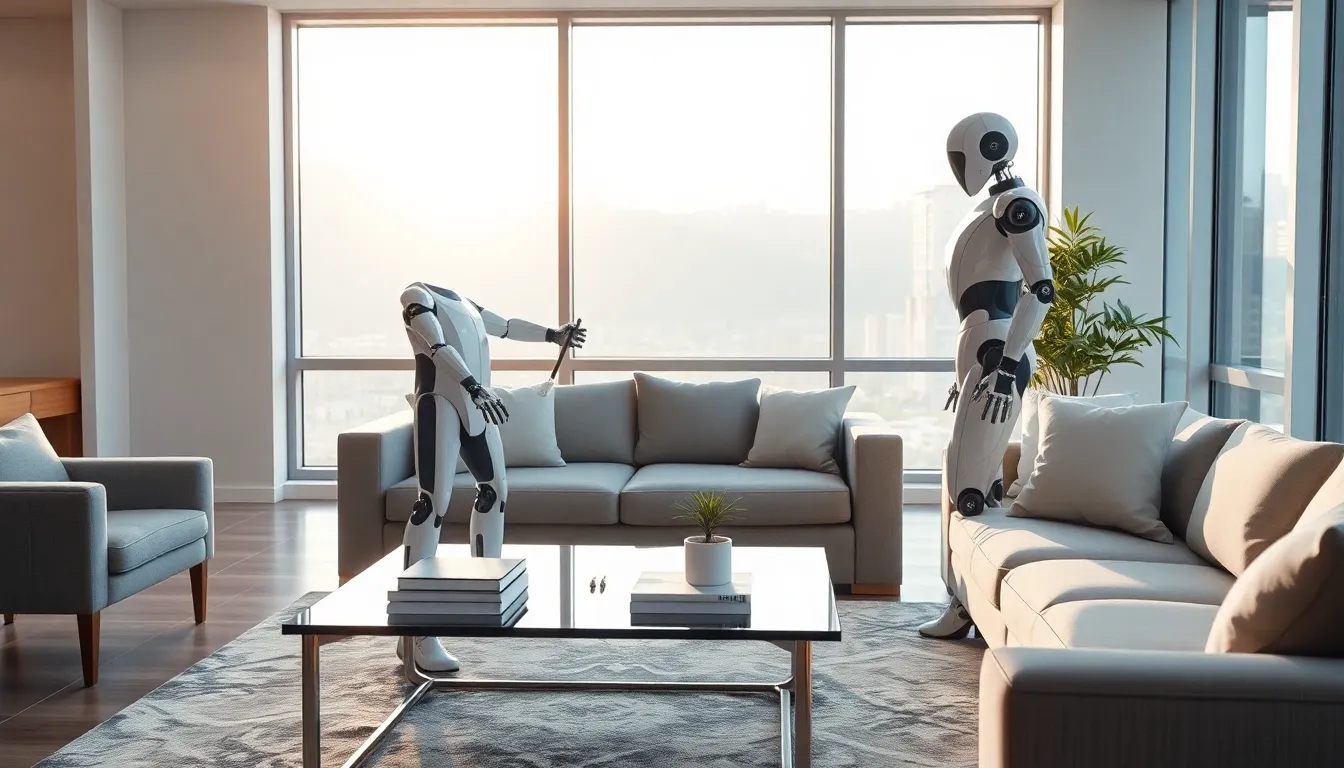Table of Contents
ToggleImagine a world where your vacuuming, dusting, and laundry woes were handled by a sophisticated robot maid. Sounds like a dream, right? From being a comedic relief to embodying deep philosophical questions, robot maids in film have not only entertained us but also reflected our evolving relationship with technology. As we investigate into this intriguing genre, be prepared for a blend of humor, drama, and a sprinkle of existential dread. Let’s take a journey through the fascinating evolution of robot maids on the silver screen.
The Evolution of Robot Maids in Film

Robot maids first captured the public’s imagination in the mid-20th century. Early films often presented them as quirky, slightly incompetent helpers, catering to society’s fascination with automation and innovation. Think of the 1960s classic “The Jetsons” where Rosie the Robot, the family maid, showcased what a future with robots might look like. This portrayal was more whimsical than realistic, reflecting a society enamored with futuristic possibilities.
As we moved into the 21st century, films began to take a different approach. The “Blade Runner” franchise and “Ex Machina” tackled themes of artificial intelligence with a darker lens, embedding their robot characters within complex narratives surrounding ethics and existential questions. These shifts marked a transition from just a mere object of convenience to characters with depth, consciousness, and often, unsettling intentions. Today, robot maids are not simply fixtures in homes: they embody the fears and hopes that define humanity’s ongoing technological relationship.
Key Themes and Motifs
At the heart of many robot maid films are recurring themes and motifs that resonate with audiences. One major theme is the idea of companionship and loneliness. With advancements in robotics, characters often grapple with their relationship with machines. For instance, films like “Her” spotlight how technology can fulfill emotional voids but raise questions about genuine connection.
Another important motif is the ethical dilemmas of artificial intelligence. Movies like “I, Robot” explore the implications of creating sentient beings. Characters wrestle with questions of autonomy, free will, and the responsibilities that come with creation. These narratives force viewers to reflect on their own moral standings in a society increasingly reliant on technology.
Also, the juxtaposition between human and machine often exposes vulnerabilities. They reveal our fears of obsolescence and highlight societal pressures on human performance, evolving expectations of productivity, and the quest for perfection.
Notable Robot Maid Movies
Several films have stood out in the realm of robot maids, each offering unique perspectives and storylines.
- “Bicentennial Man” (1999)
Based on a story by Isaac Asimov, this film follows Andrew, a robot maid who develops human-like emotions and desires. It delves deep into the question of humanity and the soul, making audiences ponder the essence of what it means to be human.
- “Ex Machina” (2014)
This film centers on a highly advanced AI named Ava, exploring themes of consciousness and the moral implications of AI technology. Though not a traditional maid, Ava’s role in the domestic sphere blurs lines, raising ethical questions about her existence and the nature of free will.
- “Her” (2013)
While not about a robot maid in a physical sense, Samantha, an AI operating system, provides companionship to Theodore. This film examines emotional attachment in artificial relationships, prompting discussions about love and connection in a tech-dominated world.
- “Robot & Frank” (2012)
This charming film portrays an elderly man who receives a robot maid as a caregiver. It captures the warmth of companionship while addressing issues of aging and the need for help in an authentic way.
These films showcase the diversity in storytelling surrounding robot maids, each leaving a unique imprint on audiences and prompting deep contemplation.
Cultural Impact and Audience Reception
The cultural impact of robot maid films cannot be underestimated. They serve as a lens through which society examines its own dependency on technology. The reception of these films has evolved dramatically: while earlier films were primarily viewed as light-hearted comedies, more recent interpretations often spark profound discussions around ethics, identity, and the future.
Viewers resonate with the human-like traits of robot maids, leading to a strong emotional connection. This has sparked numerous online discussions and fan theories, further expanding the cultural conversation. These films prompt us to reflect on how we view machines, often emphasizing that we seek more than just efficiency from technology, we desire companionship and understanding.
Also, the comedic portrayals of robot maids often critique societal norms around gender roles and domesticity. They challenge stereotypes, offering a humorous take on traditional expectations, so ensuring that audiences leave the theater both entertained and reflective.
Future Trends in Robot Maid Films
Looking ahead, the future of robot maid films appears bright and brimming with potential. As technology advances, so do the narratives surrounding it. Expect to see more films diving into the implications of AI and how they integrate further into daily life.
One exciting trend could be the rise of hybrid characters, robot maids who embody human qualities not just in functionality but in emotional depth. As audiences increasingly demand authenticity in storytelling, filmmakers may focus on developing rich backstories for these characters, exploring their struggles and triumphs.
Also, with the burgeoning interest in sustainability and ethical technology, future robot maid narratives are likely to incorporate themes around environmental impacts and social responsibility. This could spark fresh dialogue around not just what robots can do, but what they should do. The possibilities are endless, and the robots may soon be serving us plots that challenge our very understanding of what it means to coexist harmoniously with technology.



